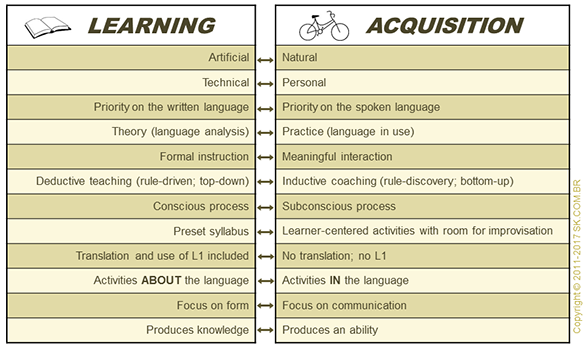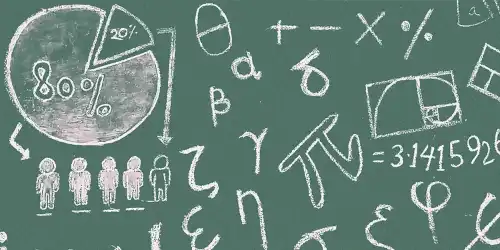

Por: Matheus W. 05 de Janeiro de 2018
LANGUAGE ACQUISITION - LANGUAGE LEARNING
Inglês IntermediárioEncontre um professor e combine aulas particulares Presenciais ou Online
http://www.sk.com.br/sk-laxll.html
conteudo no site acima
LANGUAGE ACQUISITION
Language acquisition refers to the process of natural assimilation, involving intuition and subconscious learning. It is the product of real interactions between people in environments of the target language and culture, where the learner is an active player. It is similar to the way children learn their native tongue, a process that produces functional skill in the spoken language without theoretical knowledge. It develops familiarity with the phonetic characteristics of the language as well as its structure and vocabulary, and is responsible for oral understanding, the capability for creative communication and for the identification of cultural values.
In acquisition-inspired methodology, teaching and learning are viewed as activities that happen on a personal and psychological level. The acquisition approach praises the communicative act and develops self-confidence in the learner.
A classic example of second language acquisition are the adolescents and young adults that live abroad for a year in an exchange program, often attaining near native fluency, while knowing little about the language. They have a good pronunciation without a notion of phonology, don't know what the perfect tense is, modal or phrasal verbs are, but they intuitively recognize and know how to use all the structures.
LANGUAGE LEARNING
The concept of language learning is linked to the traditional approach to the study of languages and today is still generally practiced in high schools worldwide. Attention is focused on the language in its written form and the objective is for the student to understand the structure and rules of the language, whose parts are dissected and analyzed. The task requires intellectual effort and deductive reasoning. The form is of greater importance than communication. Teaching and learning are technical and based on a syllabus. One studies the theory in the absence of the practice. One values the correct and represses the incorrect. Error correction is constant leaving little room for spontaneity. The teacher is an authority figure and the participation of the student is predominantly passive. The student will be taught how to form interrogative and negative sentences, will memorize irregular verbs, study modal verbs, learn how to form the perfect tense, etc., but hardly ever masters the use of these structures in conversation.
Language-learning inspired methods are progressive and cumulative, normally tied to a preset syllabus that includes memorization of vocabulary. It seeks to transmit to the student knowledge about the language, its functioning and grammatical structures, its contrasts with the student's native language, knowledge that hopefully will produce the practical skills of understanding and speaking the language. However, the effort of accumulating knowledge about the language with all its irregularity becomes frustrating because of the lack of familiarity with the language.
Innumerable graduates in Brazil with arts degrees in English are classic examples of language learning. They are certified teachers with knowledge about the language and its literature but able to communicate in English only with poor pronunciation, limited vocabulary and lacking awareness of the target culture.

- CPF verificado
- E-mail verificado









